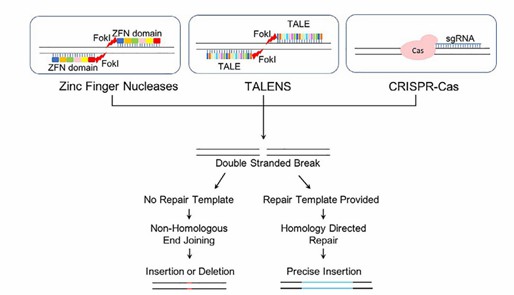Lifeasible is committed to using various advanced plant protection technologies and provides various gene editing services to help plant protection.
Gene editing technologies have multiple uses in plant protection. Advanced gene editing technologies (Fig. 1), such as CRISPR/Cas9, play an important role in breeding plants for disease resistance and resistance to environmental stresses. For example, CRISPR/Cas9-based gene editing has been used to disrupt the OsERF922 and OsSEC3A genes in rice to produce resistance to rice blast disease. In addition, gene editing technology can also be used to edit pest genes to reduce the destructive ability of pests and to edit microbial genes to produce biocontrol substances. All these gene editings can be used for plant protection.
 Fig. 1 Genome editing using ZFN, TALEN, and CRISPR-Cas (Randhawa, 2021).
Fig. 1 Genome editing using ZFN, TALEN, and CRISPR-Cas (Randhawa, 2021).
Lifeasible fuels the application of gene editing in plant protection and provides various gene editing services for plant protection. We mainly provide gene editing services for plants to obtain plant varieties with disease resistance and abiotic stress resistance. We can achieve precision plant gene editing by CRISPR/Cas9 and other gene editing technologies. We also provide pest gene editing and microbial gene editing for plant protection. Please see Plant Protection by Gene Editing for specific service offerings.
If your project has a clear knockout or knock-in requirement, please see Gene Knockout or Knockdown for Plant Protection or Gene Knock-in or Overexpression for Plant Protection.
Then, we also provide gene editing safety assessment services to help evaluate the safety of gene-edited plants, pests, and microorganisms related to plant protection.
In general, we focus on gene editing related to plant protection. We provide gene editing services not only for plant protection but also to help explore genes related to plant protection.
Superb gene editing
We master multiple gene editing technologies and are particularly good at gene editing in plants.
In CRISPR/Cas-based plant gene editing, we can achieve efficient sgRNA design, Cas9 codon optimization, selection of appropriate promoters, and efficient plasmid construction and transformation.
Flexible changes according to customer needs
We change the content of gene editing flexibly according to the needs of our clients. For example, when customers need gene-edited plants without trans-CRISPR/Cas9, we can help obtain CRISPR/Cas9-free gene-edited plants by Mendelian segregation or provide transient transformation. These flexible changes are all subject to final confirmation by the customer.
Comprehensive security assessment
We provide gene editing services along with a comprehensive gene editing safety assessment. Plant protection-related gene editing must be sufficiently safe. Our safety services cover three levels: the molecular level, the environmental level, and the food level. This contributes to a comprehensive safety assessment of gene-edited crops.

Lifeasible has extensive experience in plant protection-related gene editing. Please do not hesitate to contact us for professional services.
References